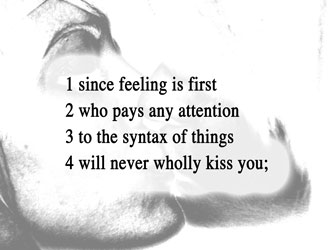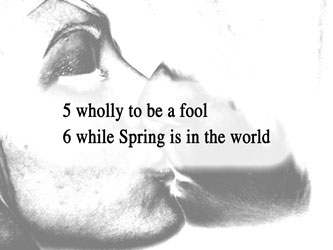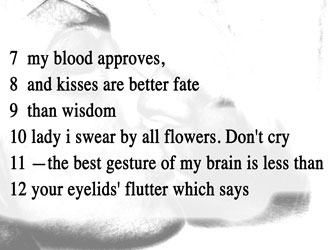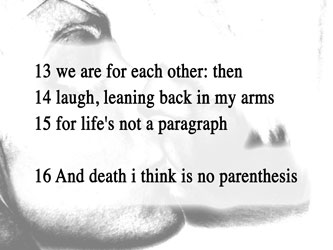Are you looking for an analysis of E. E. Cummings’ “since feeling is first”? Here is the most detailed analysis of the poem available anywhere. You are about to have heaps of fun, so read on.
First we will offer some historical background on the poem, a brief summary, and some initial comments. Then we will deliver a line by line analysis. After this we will offer not only one interpretation of “since feeling is first” but three. The last interpretation being the one closest to what we consider the real meaning and theme of the poem “since feeling is first”.

since feeling is first: Summary and Background
The poem, “since feeling is first” by E. E. Cummings, was first published in 1926 in the book is 5. This book is divided into five sections, and “since feeling is first” is poem “VII” of section “FOUR”. Despite that the poem is frequently anthologized and presented in toto by itself, we would suggest that the poem is actually better read in its proper context as it is but one part of a whole series of poems. The poem may have been written for Anne Minnerly Barton—but we’re not sure of any actual evidence pointing toward this. The chronology would fit, but the poem could easily have been written for another woman—or for an imaginary woman.
The poem is generally held to be either a carpe diem poem about seizing the day, or alternatively a seduction poem. We are not satisfied with either of these simplistic themes, however, they both offer a simple summary of the poem. Basically the narrator is trying to convince a girl to kiss him using some fancy wordplay. The narrator notes that feeling is superior to thinking, and basically urges the object of his attention to give in to his kisses.
The poem is 16 lines with 5 stanzas. While there are no rhymes per se at the end of each line, the poem does make use of poetic techniques including enjambment, assonance, and alliteration.
since feeling is first: a line by line analysis
We’d like to note that we recognize that taking the E. E. Cummings poem, “since feeling is first” and numbering each line is a bit like nailing a live animal to a dissection table and then commencing to cut it up. It’s a bloody and grotesque procedure of questionable merit. Still, if you are genuinely curious about the deeper levels of the poem, then we hope that this might offer you a little assistance.
For now we only want to suggest different ways of approaching the poem—so we’ll simply share some scattered and unrelated points. We’ll then try to bring these points together later when we interpret the poem and discuss its themes.
Analysis of lines one to four of “since feeling is first” by E. E. Cummings

• Pay attention to how the meaning changes from line to line. The narrator, Cummings, very much wants to set you up to expect one thing, and then deliver another. Line one starts with “since” and sets up the expectation of an argument. But this argument is delayed. Lines one and two combined delivers a question, but this question is not finished—and whatever answer there might be is ignored. Lines two to three together actually gives us a complete subject—basically a person who pays attention to the synax of things. We’re then in line four told something about this subject: The person, who pays attention to the syntax of things, will not ever “wholly” kiss someone. Why not? Because “feeling is first”.
• Note the first lines reads “since feeling is first” and not “since feelings are first”. This suggest we’re not talking about varieties of feeling, but feeling itself.
• We’re only four lines into the poem, and there is heaps of contradiction and ambiguity here. First, note that we have in the first four lines of “since feeling is first” an almost logical syllogism. The point of the logical syllogism is to say that we should forget about logic. But didn’t the narrator just apply some? Didn’t the narrator just make a logical argument of sorts? So logic is used to defeat logic. Do you see the internal contradiction here?
• Now, we could read the first four lines a different way. There is no reference to any “I” in the first four lines. So the narrator might be referencing themselves. For example, they could be stating: I’ll never be able to “wholly” kiss you because I’m always paying attention to syntax. If we read the poem this way, the first four lines becomes a lament, not part of a seduction. We’ll note that this is an uncommon reading of “since feeling is first”, but it is entirely possible to read the poem this way.
• The use of the word “syntax” is very important here. It’s meaning is not synonymous with logic. It’s typically said that E.E. Cummings was not concerned with syntax, but this is quite deceptive. It’s better to say that he was utterly obsessed with syntax. Syntax was E. E. Cummings’ bread and butter. Again, most will not tell you this, but everything Cummings wrote had to do with syntax. What he was striving to do in his poetry is to use syntax to break free of syntax. He wanted to break through traditional forms into something that could achieve a greater level of meaning. As much as possible he wanted to transcend syntax. How does one do such a thing? How can a poet use syntax to break free of syntax? This is the fundamental problem that E. E. Cummings addressed in virtually all of his poetry.
• The use of the word “wholly” is very important. It’s not by coincidence that it sounds like “holy”. Cummings was raised in a family devoted to unitarianism, and Cummings, himself, became keenly interested in an offshoot artistic movement called transcendentalism. We want to note that when one attempts to analyze something, this creates a subject and an object. Transcendentalism might suggest that this subject and object are illusory, and that by achieving wholeness we can achieve holiness. In this sense, knowledge creates original sin, because it separates the object from the subject. If we are paying attention only to syntax, we are not seeing the holy in wholly.
Analysis of lines five and six of “since feeling is first” by E. E. Cummings

• We think line six is very clever indeed. To be wholly a fool is to be holy. The fool is often the symbol of the young and the naive, the absolute beginner. A child is a fool that acts on sentiment and has not yet become cynical. Zen for example strives to obtain a mind that is completely spontaneous without any premeditation. In this sense, being a fool is to be pure spontaneity and sentiment without any sense of forethought. The fool is an important archetype. We recommend you read up on the foolishness of Christ. The fool is often a metaphor for beginnings and endings. He’s related to the trickster archetype. We don’t advocate mysticism of any kind, but it is notable that the fool is numbered as “0” in most tarot decks. We all begin our lives as fools.
• The capital letter that leads the word “Spring” should scream at you here. Why? Because spring doesn’t need to be capitalized, so what the heck is it capitalized here for? Cummings is famous for his lack of capitalization! It could represent emphasis or even universalization. We’re not talking about spring right now, but the eternal symbolic spring of the fool. Also, we could interpret the word as in a water spring. Water is often a metaphor for feeling, and psychologically we think this fits.
• Commenting generally here, when we start out in the journey of life we are fools. We act without any meditation. Then we get hurt, and gradually we become more thoughtful and more cynical. To us these two lines come across as a kind of sigh, “ah to be wholly a fool at the beginning of something new.”
Analysis of lines seven and twelve of “since feeling is first” by E. E. Cummings

• In line seven, the narrator notes his blood approves, but this leaves open the question about his mind. Does the narrator’s mind approve? Why even talk about one’s blood, unless it’s to contrast it with one’s mind?
• Note that between lines eight and nine, we are left with the idea that kisses and wisdom are both fates. Can one actively choose one’s fate? That would seem to be a contradiction, because fate is not chosen by definition. It’s often stated that the poem is about giving into feeling, but this also creates a contradiction. We choose with our minds, and this requires syntax. So by arguing to give into feeling is not the narrator, Cummings, leading the object of the poem astray? If I said, “think about deciding things with your feeling” there’s an implicit contradiction here. I’m telling you to do precisely what I’m telling you not to do, which is to think.
• In line ten, the narrator swears by flowers, by nature, not by some abstract notion of God or holiness. This is often regarded as yet more evidence that the narrator is on the side of feeling, yet to swear on something, anything, requires intention and commitment not spontaneity. So here is yet another contradiction. And immediately after this we’re made privy to the fact that the object of the poem is crying! No wonder!
• Regarding the admonishment in line ten to “not cry”, we have to ask, if the narrator were so keen on following one’s feeling, then why would he beg the object of the poem to not cry? Isn’t crying a free spontaneous feeling? Could tears actually be the beginning of wisdom—and the narrator doesn’t want this?
• Note there is a parallel here between Spring as a source of water and tears. We can even compare both of these to blood, which is also liquid, natural, and can be a metaphor for the emotions.
• In line eleven and twelve, the flutter of eyelids is contrasted with a gesture of the brain. Here again the dichotomy between thinking and feeling. Note, the narrator contrasts “my” brain with “your” eyelids. This is very revealing. The narrator does in fact see himself as intellectual. Otherwise, he could have just as easily said, “your” brain. Think about it.
• The eyes are a particularly interesting point, because they see, creating what some might claim is the first separation of object and subject. The eyelids are fluttering open, are they beginning to see the world and to cry? Is this the end of innocence? Is it that the narrator is trying to soothe this awakening, which in some ways is always a kind of tragic happening?
Analysis of lines thirteen to sixteen of “since feeling is first” by E. E. Cummings

• Line thirteen is a bit odd in that it seems to say, “if we are made for each other, then …” It sounds logical. The narrator is getting ready to make an if-then statement. But isn’t it syntax that the narrator is trying to escape. But then, in line fourteen, this is followed up with “laugh”. We think this is very revealing as to the whole nature of the poem. As if the narrator in the midsts of getting ready to formulate some grand argument for feeling suddenly realized the absurdity of such an action, and then just said, “well, just laugh!” because you know all my words here are silly! You know, just laugh and lean back—let me give up on all this argument which doesn’t make sense anyway.
• Line fifteen which states that “life is not a paragraph” can be read as again a contrast between feeling and thought. Writing is thought, it’s not life. At least, this is one of the standard interpretations of this line. But why does the narrator say paragraph as opposed to sentence or book or something else? Perhaps just because life isn’t a measured portion? Life is unmeasured. A paragraph is a distinct measured unity of thought, life isn’t at all like that.
• Finally, there is the last line, “And death i think is no parenthesis”, which is particularly intriguing. Note that death is not felt, but thought. We would guess this is very important. Here is the narrator exhorting all along for the object of the poem to feel, and then the narrator ends the poem by thinking about death! Ouch! Does that hurt or what?
• As far as death not being a parenthesis, this could suggest many different things. Death is not something limited, but eternal. Death is not just something that happens as an aside, but but is the main concern of thought. Knowledge of death, of course, also harkens back to the idea of original sin, when Adam and Eve bit of the apple and gained knowledge of their own mortality. In the end can we ever really maintain our innocence?

Is the theme of “since feeling is first” carpe diem?
We think the carpe diem interpretation of “since feeling is first” by E. E. Cummings is fairly straightforward. It’s an easy theme to read into the poem. We’re given many contrasting metaphors and symbols of both thinking and feeling, and clearly the narrator sides on the side of feeling.
We could thus paraphrase the poem as follows:
Don’t bother with intellectuals,
they’ll never make you feel good.
Just give into your feeling,
even if it’s foolish, and enjoy the spring.
Wouldn’t it be better to kiss than to fret
over the consequences of such kisses?
Just dry the tears that thought has given you
and give into love.
Men and women are meant for each other.
Life is short, and death is final,
so laugh and seize this moment with a kiss.
As you might guess, we find this interpretation quite awful and contrived. If you’ve heard the poem is all about placing feeling over thought, then we feel you are being short changed. This interpretation misses all the nuances of the poem and creates inexplicable contradictions. For example, why should the feeling of crying be any less important than the feeling of wanting to kiss. If fate exists, then how can we have choice? Or how can we even discuss choice, if we’re supposed to seize the moment?
We totally agree that there is an element of the theme carpe diem in the poem. Surely that is correct, but if we view the poem only from that lens of that theme, we would miss quite a bit.

Is “since feeling is first” a seduction poem?
We think the seduction poem interpretation of “since feeling is first” is also fairly straightforward. It’s yet another easy theme to read into the poem. The narrator clearly wants the object of the poem to engage in kissing—the very purpose of the poems seems to be to provoke such kisses.
We can thus paraphrase the poem like this:
I’m an uber-poet, babe,
I feel things not think them,
and that’s why I’m a good kisser.
Just give into that foolish side of yours,
after all its spring, baby, the time of love.
My blood is boiling for you,
and wouldn’t you rather have some kisses
than just play it safe and have nothing.
Come on, I see it in your eyes,
don’t cry, instead laugh, lean back
and let me kiss you.
Life’s in the moment,
not in endless thinking,
so enjoy it while you can.
Of course, we are being playful here, but can anyone really entertain the idea that “since feeling is first” is merely a seduction poem? This interpretation has to ignore every single subtle and nuance of the poem, and likewise leaves one twisted in what would then appear to be nothing more than careless contradictions. Surely, E. E. Cummings was not so utterly clumsy. We need to look a potentially deeper themes.

The Meaning of “since feeling is first”
We will now provide you with our own interpretation of “since feeling is first” by E. E. Cummings. We think the poem’s theme is ultimately about a loss of innocence, and at the same time, a meditation on the beauty of innocence.
We do think that ostensibly the poem can appear to be a carpe diem poem, or even better, a seduction poem. We think that perhaps with complete intention, Cummings is leading us astray, but only with the ulterior intent of pulling us into contradictions that cannot be resolved unless one looks outside of the poem. In this manner, the poem works as a kind of zen koan. We would encourage interested readers to check out chapter eleven of the Tao Te Ching, which to us sounds quite a bit like a zen koan. For example, consider this bit of Lao Tsu wisdom, “Thirty spokes share the wheel’s hub; It is the center hole that makes it useful.” The same can be said of much of Cummings poetry. It’s what is not said that is often most important. It’s the empty space in the poem that counts for the most!
Let’s go through the poem one more time, and explore at least some of its subtlety.
First, let’s presume lines one to four are actually about the narrator. In that case, it is both a confession and a lament. Ask yourself this, why is the object of the poem crying? Might it not be because the narrator cannot wholly kiss her, because he’s lost his innocence? He gained knowledge and is lost in syntax. Line five to six then represent him wishing he could have back his lost innocence. He wishes he could be a fool again, but once wisdom enters, how do you escape it?
He feels for his lover, because she too is now losing her innocence. We don’t think lines seven to ten can be paraphrased, but we think there is an element of getting tongue tied, of actively using thought to argue in favor of feeling, and yet seeing the contradiction in doing such. That is, the narrator is well aware of each contradiction of each line—and is trying desperately to find a way to escape them. The narrator picks up again in line 13 with the beginnings of a rational exhortation, but then wisely gives it up and just says, laugh and lean back in my arms. In other words, let’s just stop talking about it. We have to stop talking about it. Life’s not words.
The mention of death at the end is very subtle, indeed. So long as we are talking and arguing we are aware of consequence, and the ultimate consequence is death. It’s everything that we might associate with thought. Thought is entirely about avoiding negative consequences, avoiding death, yet in doing so—in becoming so absorbed in thought, we leave life behind. We don’t think the tension in the poem is resolved, but only given a greater deepness. Knowledge of death can’t be put back into Pandora’s box. Once it’s out—it stays out, it can’t ever just be parenthesized.

We hope you enjoyed our analysis of E. E. Cummings, “since feeling is first”. Don’t forget to subscribe to our updates. Please visit again!